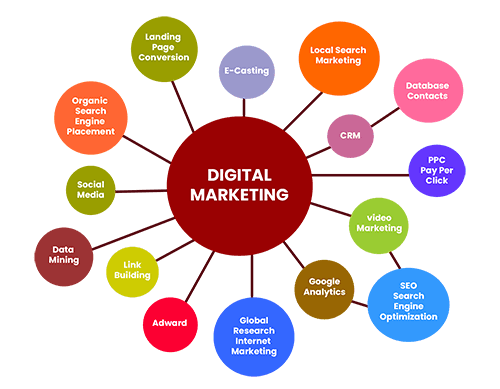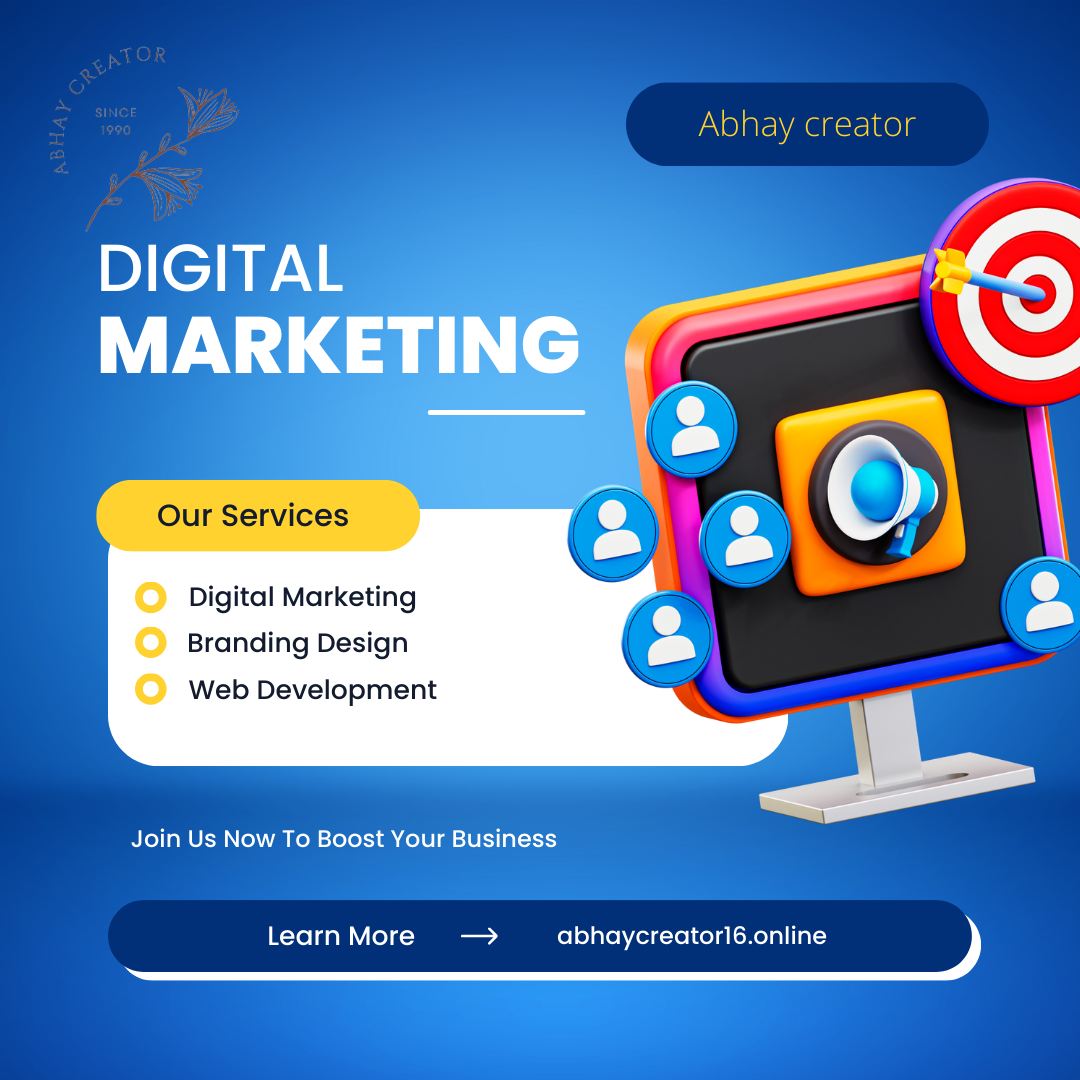Digital marketing refers to all marketing operations that use an electronic device or the internet. Businesses use online channels, including search engines, social media, email, websites, and mobile apps, to communicate with present and future customers. This type of marketing differs from traditional marketing, which uses physical media such as print ads, billboards, and television
The Important Parts of Digital Marketing
Search engine optimization (SEO): This is the process of optimizing important keywords to appear higher in search engine results pages (SERPs). Effective SEO improves a website’s exposure and drives organic (non-paid) traffic from search engines.
Content marketing involves creating and distributing valuable, relevant content to attract and engage a target audience. The ultimate goal is to drive profitable customer action.
Social media marketing: involves promoting items and engaging with customers through platforms like Facebook, Instagram, Twitter, LinkedIn, and others. Social media marketing focuses on providing content that is relevant to the environment of each platform.
Pay-Per-Click (PPC) Advertising: This is a type of internet marketing in which marketers pay a fee whenever one of their ads is clicked. Google ads is the most common PPC platform.
Email Marketing: This involves sending commercial messages to a group of people via email. It’s a powerful tool for reaching and nurturing your audience.
Affiliate Marketing: This is a type of performance-based marketing where a business rewards affiliates for bringing in customers through the affiliate’s marketing efforts.
Influencer Marketing: Leveraging influencers who have a dedicated social following and are viewed as experts within their niche.
Mobile Marketing: Promoting your business via mobile devices. This includes mobile ads, in-app advertising, and mobile-specific content.
Analytics and Data Analysis: Using data to track and measure the performance of marketing campaigns and inform future strategies.
Benefits of Digital Marketing
Digital marketing offers numerous advantages over traditional marketing methods. These benefits are crucial in helping businesses grow, reach a wider audience, and improve their overall marketing strategies.

Global Reach
Digital marketing enables businesses to reach a global audience. Unlike traditional marketing, which is often limited by geography, digital marketing allows for an international presence. For instance, a website can be seen by people from any part of the world, significantly increasing the potential customer base.
2. Cost-Effective
Compared to traditional marketing methods, digital marketing is highly cost-effective. Print, TV, and radio ads can be expensive and may not provide measurable ROI. In contrast, digital marketing strategies like SEO, social media marketing, and email campaigns can be relatively low-cost while reaching a large audience. Tools like Google Analytics and social media insights help in tracking the effectiveness of campaigns, ensuring that marketing dollars are well spent.
3. Measurable Results
One of the most significant advantages of digital marketing is its measurability. Businesses can track the performance of their digital campaigns in real-time and adjust their strategies accordingly. Metrics such as website traffic, conversion rates, bounce rates, and engagement rates provide insights into what is working and what is not. This level of measurement is not possible with traditional marketing methods.
4. Personalization
Digital marketing allows for a higher degree of personalization. Marketers can create tailored content and ads that resonate with specific audience segments. For example, email marketing campaigns can be personalized with the recipient’s name and customized content based on their preferences and past behavior. This personalized approach increases engagement and conversion rates.
5. Improved Conversion Rates
Digital marketing strategies like SEO, PPC, and email marketing are designed to drive targeted traffic to a website. These visitors are more likely to convert into leads or customers because they have shown interest in the product or service. Moreover, digital marketing allows for A/B testing, where different versions of a campaign can be tested to see which one performs better, further improving conversion rates.
6. Engagement and Interaction
Digital marketing enables direct interaction between businesses and their customers. Social media platforms, in particular, allow for real-time engagement through comments, likes, shares, and direct messages. This interaction fosters a sense of community and builds brand loyalty. Additionally, feedback from customers can be quickly gathered and used to improve products and services.
7. Enhanced Targeting
Digital marketing provides advanced targeting options. Businesses can target their audience based on various criteria such as demographics, interests, behavior, and location. Tools like Google Ads and Facebook Ads allow for precise targeting, ensuring that the marketing message reaches the right people at the right time. This targeted approach reduces waste and increases the effectiveness of marketing efforts.
8. Flexibility and Agility
Digital marketing campaigns can be quickly modified and optimized based on performance data. This flexibility allows businesses to respond rapidly to changes in the market, consumer behavior, or competitive landscape. For example, a PPC campaign can be adjusted in real-time to allocate more budget to high-performing keywords or ads.
. Better ROI
Digital marketing often delivers a higher return on investment (ROI) compared to traditional marketing. The ability to track performance, optimize campaigns, and target the right audience contributes to more efficient use of marketing budgets. Moreover, digital channels typically have lower costs associated with them, further enhancing ROI.
10. Building Brand Reputation
A strong online presence helps in building brand reputation. Consistent and valuable content, positive customer interactions, and transparent communication contribute to a positive brand image. Online reviews and testimonials also play a crucial role in shaping the perception of a brand. A good reputation online can lead to increased trust and credibility among potential customers.
Conclusion
Digital marketing is a dynamic and powerful approach to reaching and engaging with customers in the modern world. Its ability to provide measurable results, target specific audiences, and adapt quickly to changes makes it an indispensable tool for businesses of all sizes. As technology continues to evolve, digital marketing will likely become even more integral to business success.
The benefits of digital marketing are numerous and significant. By leveraging digital channels effectively, businesses can achieve global reach, cost-efficiency, personalized marketing, improved conversion rates, and better ROI. Additionally, the ability to engage directly with customers, enhance targeting, and build a strong brand reputation further underscores the importance of digital marketing in today’s competitive landscape. Embracing digital marketing strategies can lead to sustained growth and long-term success for businesses across various industries.

